
The Battle of Cape St. Vincent was one of the opening battles of the Anglo-Spanish War (1796–1808), as part of the French Revolutionary Wars, where a British fleet under Admiral Sir John Jervis defeated a greatly superior Spanish fleet under Admiral Don José de Córdoba y Ramos near Cape St. Vincent, Portugal.

Admiral Adam Duncan, 1st Viscount Duncan, KB was a British admiral who defeated the Dutch fleet off Camperdown on 11 October 1797. This victory is considered one of the most significant actions in naval history.

Vice Admiral Cuthbert Collingwood, 1st Baron Collingwood was an admiral of the Royal Navy, notable as a partner with Lord Nelson in several of the British victories of the Napoleonic Wars, and frequently as Nelson's successor in commands.

HMS Ajax was an Ajax-class 74-gun third-rate ship of the line of the British Royal Navy. She was built by John Randall & Co of Rotherhithe and launched on the Thames on 3 March 1798. Ajax participated in the Egyptian operation of 1801, the Battle of Cape Finisterre in 1805 and the Battle of Trafalgar, before she was lost to a disastrous fire in 1807 during the Dardanelles Operation.

Admiral Sir Robert Calder, 1st Baronet, was a British naval officer who served in the Seven Years' War, the American Revolutionary War, the French Revolutionary Wars and the Napoleonic Wars. For much of his career he was regarded as a dependable officer, and spent several years as Captain of the Fleet under Admiral Sir John Jervis. However, he is chiefly remembered for his controversial actions following the Battle of Cape Finisterre in 1805 which resulted in his court-martial. Though he was removed from his sea command, he was retained in the Navy and later served as Commander-in-Chief of the base at Plymouth.
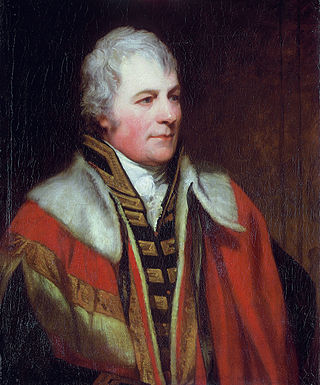
Admiral William Carnegie, 7th Earl of Northesk was a British naval officer who served during the American Revolutionary War, French Revolutionary War, and Napoleonic Wars. While in command of HMS Monmouth he was caught in the Nore Mutiny of 1797 and was the officer selected to relay the demands of the mutineers to George III. He most notably served as third-in-command of the Mediterranean Fleet at the Battle of Trafalgar in HMS Britannia. He later became Rear-Admiral of the United Kingdom and Commander-in-Chief, Plymouth.

Admiral Sir William Cornwallis, was a Royal Navy officer. He was the brother of Charles Cornwallis, 1st Marquess Cornwallis, British commander at the siege of Yorktown. Cornwallis took part in a number of decisive battles including the siege of Louisbourg in 1758, when he was 14, and the Battle of the Saintes but is best known as a friend of Lord Nelson and as the commander-in-chief of the Channel Fleet during the Napoleonic Wars. He is depicted in the Horatio Hornblower novel, Hornblower and the Hotspur.
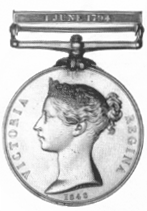
The Naval General Service Medal (NGSM) was a campaign medal approved in 1847, and issued to officers and men of the Royal Navy in 1849. The final date for submitting claims was 1 May 1851. Admiral Thomas Bladen Capel was one of the members of the board that authorised the medal.
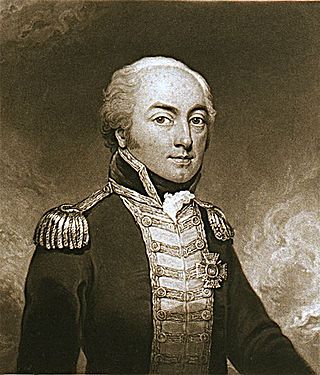
Rear-Admiral Sir George Johnstone Hope, KCB, KSO was a British naval officer, who served with distinction in the Royal Navy throughout the French Revolutionary and Napoleonic Wars, including service at the Battle of Trafalgar. A close personal friend of Admiral Nelson, he received many honours following the battle, and later served as a Lord of the Admiralty.
Admiral Sir Thomas Bladen Capel was an officer in the British Royal Navy whose distinguished service in the French Revolutionary War, the Napoleonic Wars and the War of 1812 earned him rapid promotion and great acclaim both in and out of the Navy. He was also a great friend of Admiral Nelson and can be considered a full member of Nelson's "band of brothers".

Captain Edward Rotheram CB was a senior officer of the British Royal Navy, who served for many years during the American War of Independence, French Revolutionary War and Napoleonic Wars. During his service, Rotheram saw action at several major naval engagements, including as a lieutenant at the Glorious First of June in 1794 and as captain of HMS Royal Sovereign at the Battle of Trafalgar in 1805. Although he was highly praised for his actions at both battles, he was not well regarded in the service, being once described by his admiral at Trafalgar, Cuthbert Collingwood, as "a man of no talent as a sea officer" and "a stupid man".
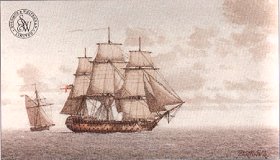
HMS Edgar was a 74-gun third-rate ship of the line of the Royal Navy, that saw service in the American Revolutionary, French Revolutionary and Napoleonic Wars. Launched in 1779, she fought in the battles of Cape St Vincent and Copenhagen, two of the major naval engagements of the wars.
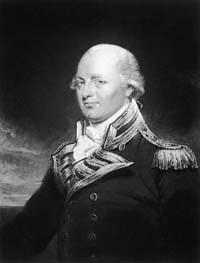
Sir Charles Cotton, 5th Baronet was a senior Royal Navy officer of the French Revolutionary and Napoleonic Wars whose service continued until his death in command of the Channel Fleet from apoplexy in 1812. During his service, Cotton saw action off the Eastern Seaboard of the Thirteen Colonies and later at the Glorious First of June. Cotton's most influential service was in 1809 when he planned and executed the evacuation of thousands of British soldiers from Corunna after the disastrous collapse of the land campaign under Sir John Moore.

William Brown was an officer of the British Royal Navy who served in increasingly senior positions during a long period from the American Revolutionary War, including the French Revolutionary War, and until the Napoleonic Wars. He began his naval career as a servant to Captain Philemon Pownoll in the frigate HMS Apollo and became a midshipman after two years. He then served on HMS Resolution with Lord Robert Manners and came home with him in HMS Andromache. He spent the next five years ashore in peacetime. After a brief time on HMS Bounty he was taken off by the First Lord and moved to HMS Ariel before Bounty sailed. He was then moved to HMS Leander, where he was commissioned by Admiral Peyton in 1788. He later captained a series of ships serving in the Mediterranean Sea, the North Sea, the Channel Fleet and then the Mediterranean, again with Lord St Vincent. He captained HMS Ajax in the Blockade of Brest and the Battle of Cape Finisterre and then at Cadiz at Nelson's personal request. After Trafalgar he had a series of shore postings as Dockyard Commissioner at Malta and Shearness before being made Commander in Chief of the Channel Islands and then Jamaica where he died.
Admiral John Bazely was an experienced and highly respected officer of the British Royal Navy who served in three wars and saw numerous actions, notably during the American War of Independence. He first gained notice with the capture of the American brig USS Lexington in 1777, following which he was rapidly promoted and by 1779 was a post captain and fought in engagements under Augustus Keppel and George Rodney with some success. He later served in the Channel Fleet under Lord Howe and fought at the Glorious First of June, although his career stagnated during the French Revolutionary Wars and he was unemployed for the final decade of his life, despite his being "regarded with respect and gratitude by his compatriots at large".
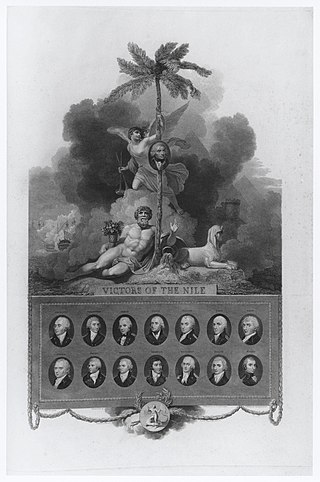
"Band of brothers" was a phrase used by Rear-Admiral Horatio Nelson to refer to the captains under his command just before and at the Battle of the Nile in 1798. The phrase, taken from Shakespeare's St Crispin's Day Speech of Henry V, later came to be more generally applied to his relationship with the captains and men under his command, such as at the Battle of Trafalgar.
William Prowse CB was an officer of the Royal Navy, who saw service during the American War of Independence, and the French Revolutionary and Napoleonic Wars. Rising from humble origins and joining the navy as an able seaman, he had a highly active career, serving under some of the most famous naval commanders of the age of sail, and participating in some of their greatest victories. He was at Grenada and Martinique under Byron and Rodney, the Glorious First of June under Howe; and commanded ships at Cape St Vincent under Jervis, Cape Finisterre under Calder and Trafalgar under Nelson. He finished his career by serving with distinction in the Mediterranean, and died with the rank of Rear-Admiral.

Admiral of the Fleet Sir George Martin was an officer of the Royal Navy who saw service during the American War of Independence, and the French Revolutionary and Napoleonic Wars. During his long naval career he took part in several significant battles, for which he was awarded a number of honours and promotions; he commanded ships at Cape St Vincent and Cape Finisterre.
The Army Gold Medal (1808–1814), also known as the Peninsular Gold Medal, with an accompanying Gold Cross, was a British campaign medal awarded in recognition of field and general officers' successful commands in campaigns, predominantly the Peninsular War. It was not a general medal, since it was issued only to officers whose status was no less than that of battalion commander or equivalent.
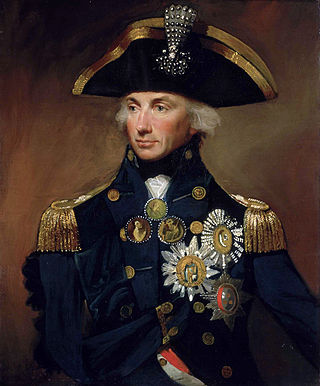
Sir Horatio Nelson, 1st Viscount Nelson, 1st Duke of Bronte (29 September [O.S. 17 September] 1758 – 21 October 1805) was a British flag officer in the Royal Navy. His inspirational leadership, grasp of strategy and unconventional tactics brought about a number of decisive British naval victories during the French Revolutionary and Napoleonic Wars. He is widely regarded as one of the greatest naval commanders in history. His victory on 21 October 1805 at the Battle of Trafalgar, led to British naval supremacy for over another century and beyond.



















